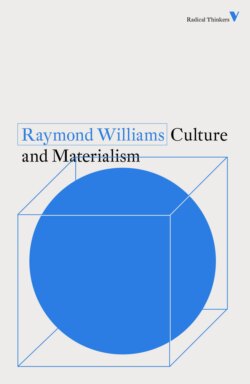Читать книгу Culture and Materialism - Raymond Williams - Страница 20
На сайте Литреса книга снята с продажи.
Uses of Totality
ОглавлениеYet, because of the difficulties of the ordinary proposition of base and superstructure, there was an alternative and very important development, an emphasis primarily associated with Lukács, on a social ‘totality’. The totality of social practices was opposed to this layered notion of base and a consequent superstructure. This concept of a totality of practices is compatible with the notion of social being determining consciousness, but it does not necessarily interpret this process in terms of a base and a superstructure. Now the language of totality has become common, and it is indeed in many ways more acceptable than the notion of base and superstructure. But with one very important reservation. It is very easy for the notion of totality to empty of its essential content the original Marxist proposition. For if we come to say that society is composed of a large number of social practices which form a concrete social whole, and if we give to each practice a certain specific recognition, adding only that they interact, relate and combine in very complicated ways, we are at one level much more obviously talking about reality, but we are at another level withdrawing from the claim that there is any process of determination. And this I, for one, would be very unwilling to do. Indeed, the key question to ask about any notion of totality in cultural theory is this: whether the notion of totality includes the notion of intention.
If totality is simply concrete, if it is simply the recognition of a large variety of miscellaneous and contemporaneous practices, then it is essentially empty of any content that could be called Marxist. Intention, the notion of intention, restores the key question, or rather the key emphasis. For while it is true that any society is a complex whole of such practices, it is also true that any society has a specific organization, a specific structure, and that the principles of this organization and structure can be seen as directly related to certain social intentions, intentions by which we define the society, intentions which in all our experience have been the rule of a particular class. One of the unexpected consequences of the crudeness of the base/superstructure model has been the too easy acceptance of models which appear less crude—models of totality or of a complex whole—but which exclude the facts of social intention, the class character of a particular society and so on. And this reminds us of how much we lose if we abandon the superstructural emphasis altogether. Thus I have great difficulty in seeing processes of art and thought as superstructural in the sense of the formula as it is commonly used. But in many areas of social and political thought—certain kinds of ratifying theory, certain kinds of law, certain kinds of institution, which after all in Marx’s original formulations were very much part of the superstructure —in all that kind of social apparatus, and in a decisive area of political and ideological activity and construction, if we fail to see a superstructural element we fail to recognize reality at all. These laws, constitutions, theories, ideologies, which are so often claimed as natural, or as having universal validity or significance, simply have to be seen as expressing and ratifying the domination of a particular class. Indeed the difficulty of revising the formula of base and superstructure has had much to do with the perception of many militants—who have to fight such institutions and notions as well as fighting economic battles—that if these institutions and their ideologies are not perceived as having that kind of dependent and ratifying relationship, if their claims to universal validity or legitimacy are not denied and fought, then the class character of the society can no longer be seen. And this has been the effect of some versions of totality as the description of cultural process. Indeed I think we can properly use the notion of totality only when we combine it with that other crucial Marxist concept of ‘hegemony’.
